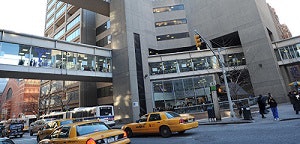When the City University of New York’s (CUNY) colleges moved to online classes in response to the coronavirus, fliers in Hunter College’s dormitories assured students they could stay in campus housing. So, junior Max Deutsch wasn’t in a rush to move out. A lot of students stuck around. The dorms were a quiet place for online work with easy Internet access, and dorm laundry machines saved them trips to germ-laden New York laundromats. But last week, the CUNY college told him his dorm was shutting down and he would have to move his belongings by Friday.
Deutsch found himself in the midst of a hectic move-out day, with students crowded in long lines containing carts heaped with possessions. Social distancing was nearly impossible, he said. Now, he’s staying at a friend’s place in Queens. He didn’t have high hopes for online learning in his family’s two-bedroom apartment, where both of his parents teach online classes of their own and his brother is remotely going to high school.
Throughout the transition, “no one knew what was going on,” Deutsch said. “No one knew what they were going to do, what was going to happen. For me personally, it wasn’t the end of the world. It was just a massive inconvenience.”
As the state of New York reaches more than 83,700 coronavirus cases, as of Wednesday afternoon, Gov. Andrew Cuomo is turning to college campuses to provide much needed space for hospital beds. To prepare, a number of CUNY and State University of New York (SUNY) campus dorms have been vacated to serve as emergency medical centers.
For the CUNY system, the transition poses a particular challenge. The campuses are a popular, affordable option for the city’s low-income students, including students who are home insecure.
“People say, ‘Oh, CUNY is the most affordable. It’s not like a private [university],’” said Timothy Hunter, chairperson of the CUNY University Student Senate and CUNY student trustee. “However, CUNY also has an average household income of $30,000 a year.”
A senior at CUNY’s New York City College of Technology, and its student government association president, Hunter heard from frantic peers when all students from other CUNY institutions, the College of Staten Island, City College and Hunter College – and some students from Baruch College and John Jay College of Criminal Justice – were asked to move out of their rooms.
For students who couldn’t afford to go home, the CUNY system arranged accommodations in the dorms at its Queens College, according to CUNY spokesperson Frank Sobrino.
“CUNY is doing all it can in the fight against the COVID-19 pandemic, including making dormitories available for use as medical facilities, as requested by the state,” a university system statement read. “Students residing in these facilities who are unable to go home are being offered placement in a dormitory at Queens College, where they will continue receiving full services.”
The CUNY system is making efforts to ease the burden of campus shutdowns on students. At Queens College, students displaced from other campuses have their own individual rooms and bathrooms to ensure proper social distancing. They’re provided three hot meals a day and food pantries are open by appointment, Hunter said.
In a Board of Trustees meeting on Monday, the system also voted to refund students forced to leave their dorms, The Brooklyn Eagle reported. Their dorm fees will be credited to them in amounts based on their move-out dates, with a quarter of their activity fees waived for students enrolled in 15-week terms and half of their activity fees waived for students enrolled for six or 12 weeks of instruction. For students graduating this term, dorm fees will be refunded based on when they left campus.
CUNY is also instituting a “Recalibration Period for Educational Equity,” a pause to get laptops and tablets to students between March 27 and April 1, before classes start after spring break.
“This, to me, is not a small consideration but pivotal to our commitment to equity, and to our mission of supporting all our students and making sure that we continue being an engine of upward mobility, even during these most trying of times for everyone,” wrote CUNY Chancellor Dr. Félix V. Matos Rodríguez in a message to students.
Still, students say the situation could’ve been better handled.
At Hunter College, Deutsch noted that students didn’t even know that their evacuation was making room for makeshift medical centers, which “makes sense.”
“The entire thing was communicated so poorly,” he said.
As a part of the CUNY University Student Senate, Hunter would have also liked to see information spread to students in a clearer way. He gets that the chancellor had to act fast – and that these are “local decisions” involving campus administrations across the state – but he thinks it would have helped to consult student leaders. He heard about the dorms shutting down from fellow students, not the university, even though he sits on the CUNY Board of Trustees.
“I definitely feel like they could’ve done a better job,” he said. “It’s not right. You shouldn’t just knock on people’s doors and tell them, ‘You have to leave tomorrow,’” which was the case at CUNY’s College of Staten Island. “That instills a real sense of fear and mistrust between students and the university.”
Hunter is now working on other ways to ease the transition for students. His main focus will be advocating for a tuition freeze. One major concern among low-income CUNY students is a possible $320 tuition hike next academic year, he said. For students who dealt with unexpected moving costs or lost their jobs, it’s no meager sum “with all this craziness going on.”
“For us to, even in the face of that, still increase tuition right now shows we don’t care about those students at all and that they don’t really matter when it comes to CUNY’s decision-making,” he said. “So, that’s going to be the big fight.”
Sara Weissman can be reached at [email protected].















